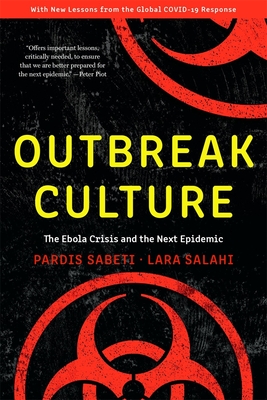

 Harvard University Press
Harvard University Press
Outbreak Culture: The Ebola Crisis and the Next Epidemic, with a New Preface and Epilogue


Key Metrics
- Pardis Sabeti
- Harvard University Press
- Paperback
- 9780674260474
- -
- -
- Medical > Epidemiology
- English
 Secure Transaction
Secure TransactionBook Description
A Choice Outstanding Academic Title of the Year
A critical, poignant postmortem of the epidemic.
--Washington Post
Forceful and instructive...Sabeti and Salahi uncover competition, sabotage, fear, blame, and disorganization bordering on chaos, features that are seen in just about any lethal epidemic.
--Paul Farmer, cofounder of Partners in Health
The central theme of the book...is that common threads of dysfunction run through responses to epidemics...The power of Outbreak Culture is its universality.
--Nature
Sabeti and Salahi present a wealth of evidence supporting the imperative that outbreak response must operate in a coordinated, real-time manner.
--Science
As we saw with the Ebola outbreak--and the disastrous early handling of the COVID-19 coronavirus pandemic--a lack of preparedness, delays, and system-wide problems with the distribution of critical medical supplies can have deadly consequences. Yet after every outbreak, the systems put in place to coordinate emergency responses are generally dismantled.
One of America's top biomedical researchers, Dr. Pardis Sabeti, and her Pulitzer Prize-winning collaborator, Lara Salahi, argue that these problems are built into the ecosystem of our emergency responses. With an understanding of the path of disease and insight into political psychology, they show how secrecy, competition, and poor coordination plague nearly every major public health crisis and reveal how much more could be done to safeguard the well-being of caregivers, patients, and vulnerable communities. A work of fearless integrity and unassailable authority, Outbreak Culture seeks to ensure that we make some urgently needed changes before the next pandemic.
Author Bio
Dr. Pardis Sabeti is a Professor at the Center for Systems Biology and Department of Organismic and Evolutionary Biology at Harvard University and the Department of Immunology and Infectious Disease at the Harvard School of Public Health. She is an Institute Member of the Broad Institute of Harvard and MIT, and a Howard Hughes Investigator.
Dr. Sabeti is a computational geneticist with expertise developing algorithms to detect genetic signatures of adaption in humans and the microbial organisms that infect humans. Her lab’s key research areas include: (1) Developing analytical methods to detect and investigate evolution in the genomes of humans and other species (2) Examining host and viral genetic factors driving disease susceptibility to the devastating and deadly diseases in West Africa, Ebola Virus Disease and Lassa hemorrhagic fever. (3) Investigating the genomes of microbes, including Lassa virus, Ebola virus, Plasmodium falciparum malaria, Vibrio cholera, and Mycobacterioum tuberculosis to help in the development of intervention strategies. (4) Determining the microbial cause of undiagnosed acute febrile illness.
Dr. Sabeti completed her undergraduate degree at MIT, her graduate work at Oxford University as a Rhodes Scholar, and her medical degree summa cum laude from Harvard Medical School as a Soros Fellow. Dr. Sabeti is a World Economic Forum (WEF) Young Global Leader and a National Geographic Emerging Explorer, and was named a TIME magazine ‘Person of the Year’ as one of the Ebola fighters. Her awards included the Smithsonian American Ingenuity Award for Natural Science, the Vilcek Prize for Creative Promise, the NIH Innovator Award, the Packard Fellowship, and an Ellis Island Medal of Honor. She has served on the MIT Board of Trustees and the National Academy of Sciences Committee on Women in Science, Medicine, and Engineering. Dr. Sabeti is also the lead singer and co-song writer of the rock band Thousand Days.
Dr. Sabeti is one of the co-founders and a shareholder of SHERLOCK Biosciences, a company dedicated to improving health worldwide through accurate, fast and affordable testing. She is on the board and a shareholder of Danaher Corporation, the parent company of both Cepheid and IDT. She is a scientific advisory board member and shareholder of NextGen Jane, a women's health company launched by two lab alumni.
Dr. Sabeti’s lab focuses on developing new analytical and genomic methods to study evolutionary adaptation and genetic diversity in humans and pathogens, with three current research foci: (1) Identifying and characterizing the underlying adaptive changes that have shaped the human species over time; and (2) Investigating genetic diversity in pathogens such as Lassa virus, Ebola virus, Zika virus, and Babesia microti, towards improved diagnostics, surveillance, and interventions, and (3) Developing novels tools to detect and diagnose microbes causing human morbidity and mortality.
Source: sabetilab.org
Videos




Community reviews
Write a ReviewNo Community reviews